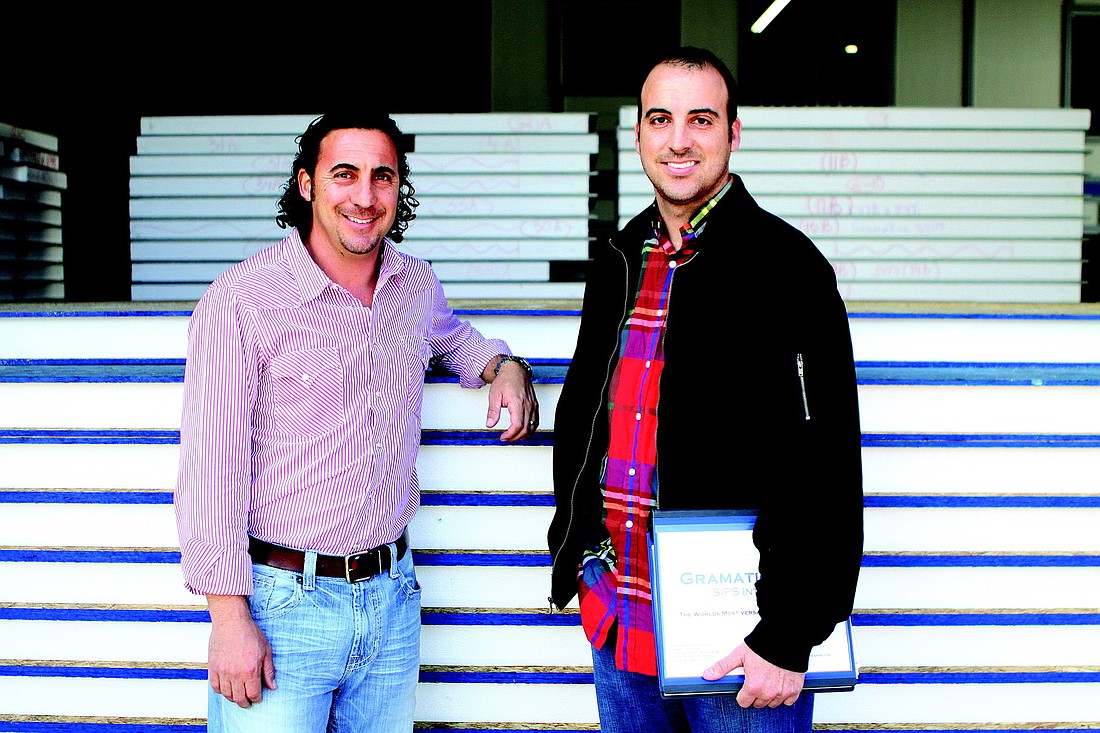- April 23, 2024
-
-
Loading

Loading

The Gramatica brothers have made a habit of sticking together.
When eldest brother Martin Gramatica became a football kicker, younger brothers Bill and Santiago followed. Gramatica decided to go pro (with the Tampa Bay Buccaneers), as did, Bill, who played with the Arizona Cardinals, and Santiago, who was injured before he could play with the New York Dragons in the Arena Football League.
“We always looked up to Martin and wanted to follow in his footsteps,” said Santiago Gramatica. “He was a father figure.”
After their pro careers ended, there was no question that the Gramatica brothers would stick together in the post-football lives.
What they didn’t know is that their new line of work would bring them to Sarasota.
Martin, Bill and Santiago Gramatica created last January a construction company called Gramatica SIPS Inc., with its office on 19th Street East, in Sarasota.
“We love Sarasota,” said Gramatica, who won a Super Bowl with the Buccaneers in 2002. “We live in Tampa, but our staff lives in Venice. So we wanted to choose a place in the middle.”
Gramatica SIPS manufactures a special type of insulated panel wall that is easy to build, less expensive to buy and more energy-efficient than regular wood, brick or concrete walls.
The company just signed an agreement to build six homes in Haiti to replace those destroyed in the Jan. 12, 2010, earthquake, and, eventually, they plan to create an entire village.
“We’ve been working toward this since the earthquake happened,” said Santiago Gramatica.
A roundabout way
The Gramaticas admit just two years ago they knew nothing about construction — and they’re still learning.
“I feel like a rookie every day,” said Gramatica.
Gramatica ended his career in 2008 with the New Orleans Saints.
He knew he wanted to start a post-football business with his brothers, but he wasn’t sure just what.
Three years after Hurricane Katrina, he saw how the city of New Orleans was still devastated.
“It looked like the hurricane had just come through,” he said.
He knew then that he wanted to do something to help the victims of that disaster and other disasters.
The Gramaticas began researching construction materials and stumbled upon SIPS — structurally insulated panel systems.
“We didn’t just jump into this,” said Santiago Gramatica. “We wanted something new, energy-efficient, easier, quicker. The future.”
The panels the Gramatica SIPS creates are made of a strong but lightweight fiber cement surrounded by water-resistant plywood. They won’t rot and are termite-proof.
And the unique place-by-number system the company created makes building a home more simple.
“One of our 3,800-square-foot buildings was put together in less than a week by three men with one power drill,” said Gramatica.
That building is in Tampa. It is so energy-efficient that even with the extreme cold this winter, its owners have not once had to turn on the heat.
“They’re LEED certified and have 70% less energy costs,” Gramatica said. “The Habitat (for Humanity) homes we’ve built save their owners the equivalent of two-and-a-half mortgage payments a year.”
Gramatica says if he hadn’t played for New Orleans, he most likely would not be in this business now.
“We would be doing something together,” he said. “I’m not sure what, though.”
Help for Haiti
In the Gramatica SIPS warehouse in Sarasota, sit three 7-foot-tall stacks of the company’s special panels. Each stack represents one home that will be built in Haiti.
At a total cost of $10,000 each, which includes shipping, construction, even paint, the company had been seeking funding for the past year to complete this project.
The money was raised through the United Aid Foundation. Gramatica said the NFL has pledged to donate some funds as they continue work toward building an entire Haitian village.
All that’s needed now is a shipping container to send the supplies to the Caribbean nation. The Gramaticas are trying to find someone to donate one.
Many Haitians are now afraid of concrete structures, because so many died trapped under concrete rubble. The lightweight SIPS panels were a perfect choice to help rebuild.
The 12-foot-by-40-foot homes were carefully designed.
“We wanted to adapt to their culture, instead of saying, ‘This is what you get,’” Gramatica said.
He explained that because Haitians like the outdoors, the homes have large front porches and no kitchens, which allow for communal outdoor cooking. And each pitched roof can collect rainwater.
Three more homes will be delivered later this year, and as soon as the funds can be collected, Gramatica SIPS will begin constructing the village, which will include homes, a central cooking facility and other communal structures.
“Three-to-six homes doesn’t seem like a lot, but they fit a lot of people,” said Gramatica.
Each home is designed for 10 to 12 family members, and because they are designed to Miami-Dade hurricane standards, they can shelter more more people during hurricanes and tropical storms.
“We can go 20 or 30 years from now and see these homes,” said Santiago Gramatica. “So, it’s very rewarding.”
Aside from its work in Haiti, Gramatica SIPS will continue to build homes for Habitat for Humanity and will construct private homes and buildings.
In fact, the company is starting to market a method in which it wraps an existing home with its SIPS panels to create more energy efficiency.
This family business is set to thrive … as long as Gramatica can keep his younger brothers in line.
“They call me ‘the boss,’ because I’m the oldest, but they all do whatever they want,” he joked.
Panel makeup
Gramatica SIPS created panels that are made of lightweight fiber cement and surrounded by water-resistant plywood. The panels won’t rot and are termite-proof. One Habitat for Humanity home that was built using the panels reported a 70% reduction in energy costs.
Contact Robin Roy at [email protected]